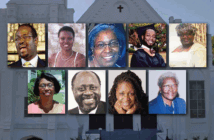Navigating the complicated and divisive issues of vaccines and mask-wearing has made ministry during this pandemic even more fraught for many pastors and congregations. Doug Powe and Jessica Anschutz of the Lewis Center say the key question is about how we can be God’s ambassadors in the midst of this tension. They outline four strategies to reframe the debate.
It feels like we are constantly drawing lines in the sand in the United States. One of those lines is over wearing a mask and being vaccinated against COVID-19. At first glance it seems like those in favor of masking and vaccinations are on one side and those against masks and vaccines are on the other side. The reality is more complicated and navigating this complicated space in the midst of a pandemic continues to create anxiety and tension. Some are waiting for the remaining vaccinations to move from emergency status to full FDA approval. Others seek a religious exemption from the vaccine. But for many in congregations the real question is: “How do we focus on our call as God’s ambassadors in the midst of the tension?”
Develop a clear policy focused on safety and inclusion.
Congregations need to develop clear policies in terms of masking and vaccination status. The policy should conform to national, state, and local standards. Key questions are about how to be hospitable, how to keep everyone safe, and how to avoid singling people out. Congregations are unique places called to connect everyone to God. Everyone means those on both sides of the line drawn in the sand. It also means a commitment to safety for everyone while not singling anyone out. For the sake of being in community together, everyone may need to wear a mask regardless of vaccination status. The key is not only explaining this policy, but the rationale behind it — our unique calling to be a conduit to God for everyone. The goal is to create a space where everyone can be in community and remain safe. Those on both sides of the line may complain. The vaccinated may feel they are being punished by having to wear a mask. Those who oppose mask-wearing may feel their rights are being infringed. But we need to remind people that it’s not about us. It’s about our unique calling to be a community that connects all people to God.
Create a safe space for dialogue.
In many cases, those who are most vocal are longing to be heard. Try to steer conversations away from social media and toward in-person dialogue. Create safe spaces for those on both sides to talk and reflect in one-on-one meetings, phone conversations, and small group gatherings. Set boundaries by clarifying what’s appropriate (open, honest dialogue, sharing feelings, etc.) and what is inappropriate (sharing misinformation, trying to change another’s opinion, etc.). Encourage conversation partners to reflect on their assumptions. Reflect back what you hear. Ask questions for understanding. Listen deeply for concerns and fears. Respond with care, compassion, and concern rather than counterpoints. And admonish all to “be quick to listen, slow to speak, slow to anger.” (James 1:19)
Focus on common ground.
In preaching and teaching, focus not on divisiveness but on the common ground shared as people of faith. What are the congregation’s shared values and morals? And how do they relate to the tension? For example, how do the congregation’s baptismal and membership vows or its mission and vision inform the debate over COVID protocols? In the midst of the tension, how is God calling the congregation to respond to those who agree and those who disagree? Build upon shared faith practices that empower God’s ambassadors such as giving thanks, prayer, and love of God, neighbor, and enemy. Strive to “lead lives worthy of the Lord, fully pleasing to him, as you bear fruit in every good work and as you grow in the knowledge of God” (Colossians 1:10).
Be a calm, non-anxious presence.
As COVID-19 infection rates and tensions over masking and vaccinations continue to rise, it is important for church leaders, both clergy and laity, to be a calm, non-anxious presence. Rather than expending time and energy on debate, offer a listening ear, care, and compassion to persons on both sides of the line in the sand. To cultivate a non-anxious presence, church leaders should take time for self-care, prayer, spiritual renewal, collegial and familial relationships, rest, and relaxation. Avoid the temptation to engage in debate and instead focus on extending care and compassion.
By developing a clear policy, listening deeply, drawing on shared values and morals, and being a calm, non-anxious presence, church leaders can reframe the debate and empower congregations to be God’s ambassadors in the midst of the tension.
Related Resources
- Why Reopening a Church is Different by Alex Shanks
- 5 Ways Churches Can Play a Critical Role in Vaccination Efforts by Asa J. Lee
- Acknowledging the Toll of the Pandemic on Ministry Leaders by Mike Bonem







